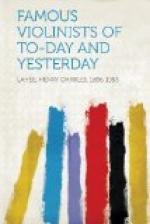Wieniawski was a man of somewhat enthusiastic nature, and his actions were not always tempered by the most perfect wisdom. It was said that just before his marriage to Miss Hampton he took a run up the Rhine, not, like a wise man, waiting until he had some one to take proper care of him. The consequence was that he must just take an hour’s look into Wiesbaden to see several old friends, and this led naturally to passing an idle moment looking at the green table doings. Here the excitement became too great for one of his temperament, and he felt compelled to stake a small sum. A small sum led to a larger amount, and when he left the place he was poorer to the tune of forty thousand francs, and he came away to his bride a sadder and wiser man.
Although a great gambler, Wieniawski owed the loss of a large part of his fortune to the failure of a New York banking firm in 1873, rather than to his favourite propensity.
The friendship between him and Vieuxtemps was very strong, in fact it was described as being ideal. Once, while Wieniawski was playing at a concert, Vieuxtemps was among the audience, and, at the conclusion of one of the violinist’s solos, Vieuxtemps called, at the top of his voice, “Bravo, Wieniawski!” This drew attention to Vieuxtemps, who was immediately recognised by the audience and enthusiastically welcomed.
Wieniawski’s compositions number two and twenty. As a proof of the old adage that “doctors do not always agree,” we are told by one excellent authority that his D minor concerto, the two polonaises, and his “Legende” will probably never vanish from the violinist’s repertoire, and by another that Wieniawski’s compositions are not of much importance. Both statements are no doubt true, for there are many fascinating concert pieces which, from the strictly classical point of view, are not important additions to musical literature.
An American critic wrote of him, after his first appearance: “In Wieniawski we have the greatest violinist who has yet been heard in America.... Of all now living Joachim alone can claim superiority over him.”
This sweeping enthusiasm was not universal, for a critic more difficult to please wrote as follows: “Wieniawski’s playing is as perfect as a faultless technique, artistic culture, great aesthetic sensibility, and perfect mastery over himself and his instrument can make it But with all its perfection we cannot but feel that the great original, heaven-and-earth-moving master-soul is wanting.”
He was also severely scathed by a critic in New York in 1872, who wrote: “Some people like pure, clear tone,—others don’t. Those who admire scratching and false stopping, together with sundry other things of the same nature, would have experienced wild joy upon hearing Beethoven’s “Violin Concerto” as it was played by Wieniawski; but for those who regard a correct intonation as a thing of primal importance, it could not have been pleasing. Wieniawski belongs to that school of which Ole Bull is a prominent member, whose first article of belief is that genuine passion and fervour is signified by rasping the strings.”




